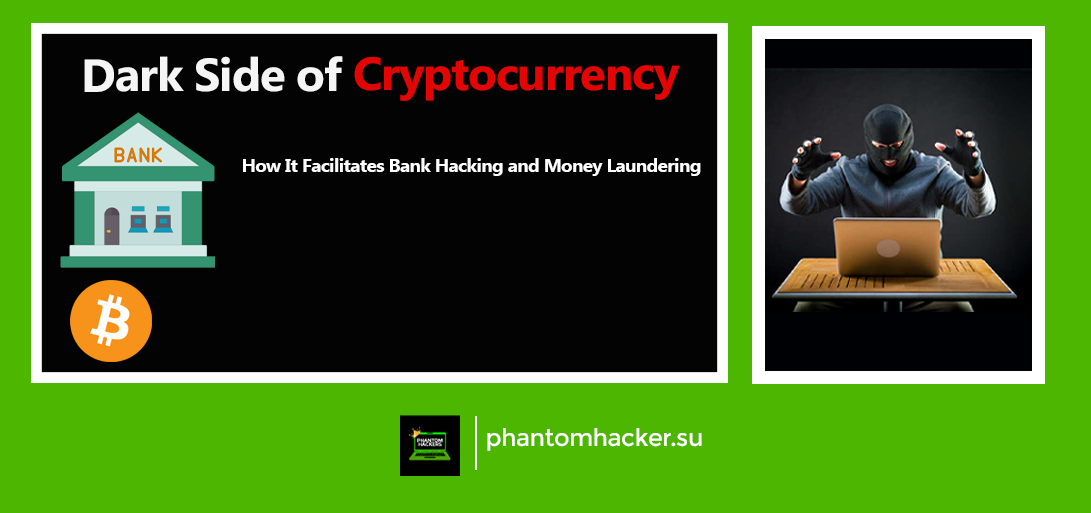Introduction:
Cryptocurrency is a form of digital currency that uses encryption techniques to regulate the generation of units of currency and verify the transfer of funds. It has been gaining popularity over the years due to its decentralized nature, which allows for fast and secure transactions without the need for intermediaries like banks. However, there is a dark side to cryptocurrency that many people are unaware of, which is its role in facilitating bank hacking and money laundering. In this article, we will explore the dark side of cryptocurrency and how it is being used to facilitate criminal activities.
What is cryptocurrency and how does it work?
Cryptocurrency is a form of digital currency that uses cryptography to secure and verify transactions as well as to control the creation of new units of a particular cryptocurrency. Transactions made with cryptocurrency are recorded on a digital ledger called a blockchain, which is maintained by a decentralized network of computers. Unlike traditional currencies, cryptocurrencies are not backed by any government or financial institution and are not regulated by any central authority.
Dark side of cryptocurrency:
While cryptocurrency has many advantages, it is also being used for illegal activities such as bank hacking and money laundering. Since transactions made with cryptocurrency are anonymous and not easily traceable, it is the perfect tool for criminals to launder money and evade law enforcement. In addition, cryptocurrency has been used to facilitate the payment of ransoms in cyberattacks.
Cryptocurrency and bank hacking:
Bank hacking has become a major concern for financial institutions in recent years. Cybercriminals are increasingly targeting banks and other financial institutions to steal money and sensitive information. Cryptocurrency has made it easier for these criminals to carry out their activities since it allows for fast and anonymous transactions. Criminals can use cryptocurrency to transfer stolen funds to offshore accounts or other digital wallets without leaving a trace.
Cryptocurrency and money laundering:
Money laundering is the process of making illegally obtained funds appear legitimate. Criminals use various methods to launder money, including using cryptocurrency. Since cryptocurrency transactions are anonymous and not easily traceable, it is an ideal tool for money laundering. Criminals can use cryptocurrency to move money across borders without being detected by law enforcement. They can also use cryptocurrency to purchase goods and services without leaving a paper trail.
HACKERS DOING CLEAN UNLIMITED MONEY TRANSFERS TO ALL COUNTRIES
YOU CAN NOW BUY LEGIT MONEY TRANSFERS FROM HACKERS
Frequently Asked Questions (FAQs):
Q: Can cryptocurrency be used for legal purposes? A: Yes, cryptocurrency can be used for legal purposes such as buying goods and services online.
Q: How is cryptocurrency being used for money laundering? A: Criminals use cryptocurrency to move money across borders without being detected by law enforcement. They can also use cryptocurrency to purchase goods and services without leaving a paper trail.
Q: Can cryptocurrency transactions be traced? A: Cryptocurrency transactions are recorded on a blockchain, which is a digital ledger that is maintained by a decentralized network of computers. While transactions are not easily traceable, they can be traced with the right tools.
Conclusion: While cryptocurrency has many advantages, it is also being used for illegal activities such as bank hacking and money laundering. Its decentralized nature and anonymity make it the perfect tool for criminals to carry out their activities. To combat this, governments and financial institutions need to work together to develop regulations that can curb these illegal activities. While this may limit the freedom that cryptocurrency provides, it is necessary to ensure that it is not being used to facilitate criminal activities.
Related sources to topic:
- “The Dark Side of Cryptocurrency,” by James Martin, TechRadar.
- “Cryptocurrency and Money Laundering: An Overview,” by Jacob S. Farber, Georgetown Journal of International Law.
- “How Cryptocurrency is Used for Money Laundering and What Can be Done About It,” by Simon Johnson, Forbes






